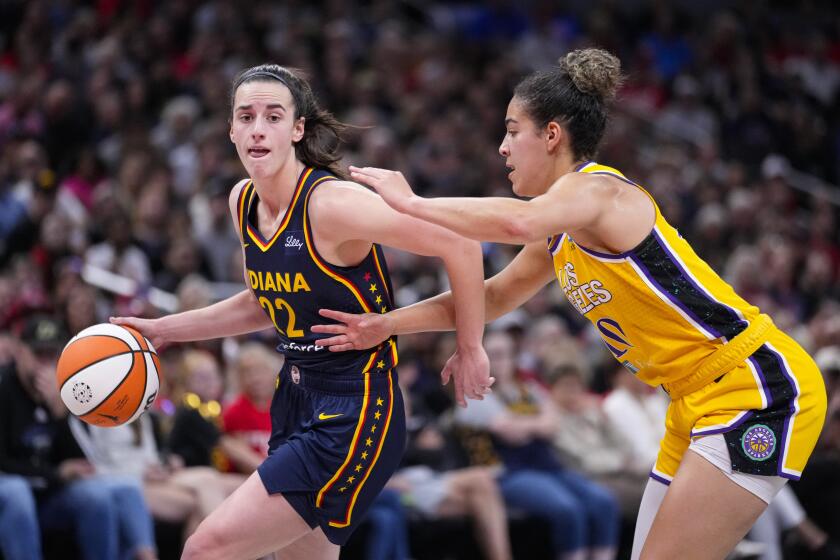Horse of Year Could Have Claim to Fame
The closest vote ever for horse of the year came down in 1984, when year-end developments made it a tough call between John Henry and Slew O’ Gold.
Bloc voting among turf writers, track racing secretaries and the Daily Racing Form staff determines the national champion, with at least a 2-1 edge among the three groups needed to clinch the title. But once in a while, that process falls short, and 1984 was one of those years.
The 1999 voting might be another. Artax, Charismatic or Daylami will be crowned 1999’s horse of the year Monday night at the Beverly Hilton, and the voting, which closed in early December, was thought to be so close that the tie-breaking mechanism--total votes--was kept at the ready.
In 1984, the year of the first Breeders’ Cup, the inaugural day of million-dollar races at Hollywood Park left the voters stymied. Slew O’ Gold could have clinched the title with a win, but he ran third--later to be moved up to second on a disqualification--in the rough-and-tumble $3-million Classic. Wild Again, the Classic winner, had a spotty record the rest of the year, and John Henry, the 1981 horse of the year and one of the ’84 favorites, had been forced out of the Breeders’ Cup Turf with an injury.
The result at the polls was inconclusive. The turf writers, the biggest voting bloc, favored Slew O’ Gold, 47-46. The Daily Racing Form went the other way, favoring John Henry, 42-24. Instead of breaking the tie, the racing secretaries split 20 votes between the two horses. Total votes made John Henry the winner, 98-81.
The 1999 Breeders’ Cup, instead of settling the issue, also clouded it. With at least five horse-of-the-year contenders running in the Classic, Cat Thief, winner of only one earlier race all year, was the 19-1 winner. And horses at odds of 26-1, 73-1 and 63-1 were next across the finish line.
After all the wholesale ticket-tearing, voters cast their eyes toward horses that had been able to win earlier in the day, and a horse whose meteoric campaign had crashed in early June.
In a little less than a month, Charismatic put together three stakes wins, two of them in the Kentucky Derby and Preakness. His Triple Crown hopes were dashed in the career-ending Belmont Stakes, in which he still finished third on only three good legs.
Artax and Daylami went all the way to the end of the year. Artax turned into a peerless sprinter who won his last three starts in brilliant times, climaxed by six furlongs in 1:07 4/5 in the Breeders’ Cup Sprint.
Daylami was also a specialist, running only on turf after his fifth-place run in the Dubai World Cup in March. He won three major races in England and Ireland before posting a captivating victory in the Breeders’ Cup Turf, his only start in the U.S.
There are no ground rules for voters who consider foreign horses. One start in North America is enough to make a horse eligible for horse of the year, and it seems that with no parameters, no two voters assess overseas races alike.
Turf horses occasionally are voted horse of the year, usually in a year when the dirt horses don’t distinguish themselves. John Henry was adept at both dirt and turf. Daylami could become the first grass runner to win the title since Kotashaan in 1993, the year Bertrando was voted best older dirt horse after losing to the longshot French import Arcangues in the Breeders’ Cup Classic.
It’s even harder for a sprinter to be voted horse of the year. In 1974, Forego, the sprint champion, also won his first of three consecutive horse-of-the-year titles, but the durable gelding was no one-note performer like Artax. Carrying weight by the carload, Forego was also voted best older dirt horse in ’74. He won that title the next three years as well.
Charismatic won only four of 10 starts and Artax’s winning percentage was even lower, with four wins in 15 tries. He won only once before his three-race streak at the end. He lost five straight to start the year, then lost six in a row later on. The voters who liked him say that he shouldn’t have been penalized for the early part of the year, when he was running in two-turn races at Santa Anita, but the truth is, he lost 10 times at less than a mile before he found his stride in late September.
As for Charismatic, Beverly Lewis--who raced the horse with her husband, Bob--said, “I hope the voters don’t hold it against our horse because he was a claimer.” In February, trainer Wayne Lukas threw Charismatic into a $62,500 claiming race at Santa Anita, but there were no takers. Charismatic won that race, on a disqualification, and Lukas promised the Lewises that they would never do that again. Charismatic finished no worse than fourth after that, with three wins, two seconds and the Belmont third in seven starts.
Instead of downgrading Charismatic because of the claiming stigma, voters more than likely moved him up. This was the rags-to-riches story of the year, the unwanted horse who got good enough to win the Derby at and went on to a near sweep of the Triple Crown.
More to Read
Go beyond the scoreboard
Get the latest on L.A.'s teams in the daily Sports Report newsletter.
You may occasionally receive promotional content from the Los Angeles Times.










